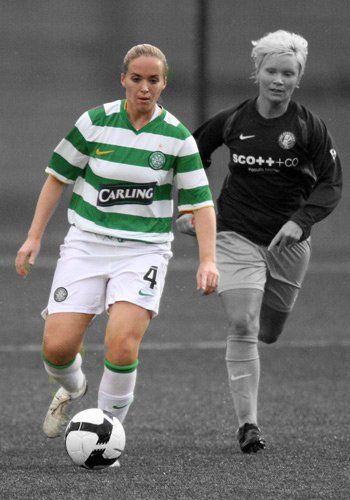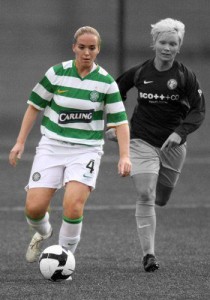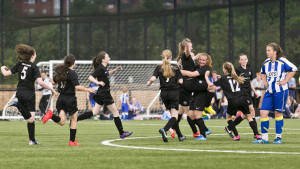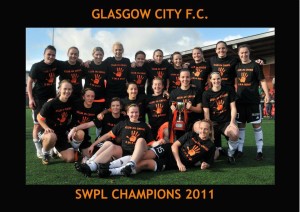Amy McDonald was an elite footballer, who captained Celtic ladies and played for Scotland. Three years ago an injury forced her to give up playing the sport she loved and caused her to question her identity. Amy’s blog shares her struggle and how, as Head of Youth at Glasgow City FC, she wants to raise awareness of the impact injury can have on an athletes mental health and why it is important that we are aware of our teammates and the players we coach.
I was very honoured when I was asked to write a blog for Scottish Women in Sport.
My name is Amy McDonald.
It has taken me a while to accept my name without the “plays for Scotland” or “captain of Celtic Ladies” label being thrown in. I was defined by football. I was elite. I am now Head of Youth at Glasgow City FC, and my journey to where I am now has, at times been a difficult one.
Three years ago playing against Aberdeen, I ruptured my lateral ankle ligament. I was placed in the hands of Louise our club physiotherapist who was fantastic until she could do no more. I was then passed to the NHS.
Three years on and I don’t know if I will ever play football again.
My journey is one that now should be shared, in the hope that it will give others reassurance that all is not lost when injury strikes.
In these three years I can look back and say that I lost my identity. People introduced me, and still do, as having 35 caps or ex captain of Celtic Ladies. I would wince with shame or embarrassment of what I was and what I clearly was no more. Inside, I faced a turmoil which I now watch some of our youth players face.
I searched for the drive to swim, to bike, to train but could never reprise the passion or discipline required to be an elite footballer. More shame. There is, and was no better feeling than being an elite player, playing the game you love.
I became angry at home, unable to communicate and isolated as I thought no-one would understand. I was surrounded by team mates and people but no-one knew what I was going through other than those who were close enough to see it but not understand fully what was causing it.
It’s a hard thing to describe your own behaviour, but I will try. It was like being in a bubble. Floating through life disconnected by the walls. Watching television but not knowing what was on. Being engaged in conversation and not knowing what people were saying. Reading your phone and not knowing what you just read.
In hindsight, I probably suffered from mild depression. The same way a chef would if they could no longer cook. My passion in life became my foe. I went from training 8-10 times a week to nothing. That physical and emotional release had gone from my life.
It wasn’t my choice and if it was I could have probably accepted it. I know now I am not alone.
CHECK The recent deaths of Jack Syme and Katie Shephard highlights a sinister undertone and a problem growing in sport.
Daily, I am responsible for 110 youth players, with the support of an amazing group of volunteers. This is my day job. I became the first female head of youth football in Scotland and I am extremely proud to be in this position. A twist of fate that I believe was meant to happen, underpinned by the faith of a club who believed in me on and off the pitch.
I sometimes see the fear in young eyes when they roll their ankle or their knee goes without warning. We have physiotherapists who we are indebted to for their support, but for me it is not enough. We are an elite amateur club. A cliche within itself. Our physios do what they can with limited resources and time. Outwith that 15-20 minutes, players are on their own at home or at the side of the pitch.
Many women in sport are what I would define as elite – in their dedication, ability and focus. But the funding remains and caters only for when you are actively elite – part of a team or individual lucky enough to qualify for funding and professional support.
When that funding isn’t there, resources are stretched and often we forget the player who has broken their collar bone or damaged their ACL. Often feeling like ‘scrap’ and these now too common problems are only highlighted when a famous footballer such as “Gazza” or others turn to gambling, drink, drink, drugs or in some cases suicide.
By writing this blog I hope to make coaches out there aware that a call and reassurance to your players or athletes goes a long way. Longer than you may think. To a player, I emphasise this – you are not alone, reach out and accept support from those close to you. Don’t be scared to talk about how you feel.
To the general population I want to raise awareness of this serious issue – when the daily dedication and commitment to sport, or anything for that matter, is suddenly pulled away, it can leave a deep scar and emptiness.
I am fortunate to be in the position that I am. That I have somehow landed on my feet (one works better than the other) is something that I am grateful for every day – being part of the sport I love. Credit to those who I hold nearest and dearest for not ringing my neck. They know who they are.
I have and always will be a reflective person. On reflection I should have spoken up, I should have asked for help and I could have done many more things. But somehow shame, embarrassment and denial can cause you to get lost. When you have nothing to be ashamed and embarrassed about. Believe me, I now know all too well.
For those that know me, this blog will likely come as a surprise. On the outside I am happy, jovial, serious when needed and a confident individual. The tone of this blog is not full of my usual sarcasm, but rather a stern message – please be aware and do more for these individuals who become injured. We need to be better. We need to be alert when team mates with injuries are quiet, or withdrawn – call them up for coffee, keep them in group messages about games and training. KEEP THEM IN THE GAME whether it’s hockey, sailing, netball, basketball, badminton or curling. I know that my journey is shared by someone you know.
Whilst writing this I felt very vulnerable and exposed. I now realise I have pretty much been a closed book and now I am leaving myself open. I will face criticism, no doubt and questions I couldn’t answer before now. Even now, I probably still cannot answer them all. But I will try my best, which is what I do throughout all areas of my life; football included.
I will continue to steer Glasgow City FC’s youth academy to be better on and off the pitch. Perhaps I will be asked to write again on how I intend to do it or what it is that I actually do – part two after self-realisation. For now though, there are no more important messages than the ones above.






A great and truly honest piece from someone I am proud to know. I hope this is the first of many Amy?